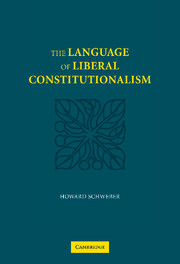Book contents
- Frontmatter
- Contents
- Introduction
- 1 The Search for Sovereignty: Law, Language, and the Beginnings of Modern Constitutionalism
- 2 Consent How? Challenges to Lockean Constitutionalism
- 3 Constitutional Language and the Possibility of Binding Commitments
- 4 Consent to What? Exclusivity and Completeness in Constitutional and Legal Language
- 5 The Question of Substance: Morality, Law, and Constitutional Legitimacy
- 6 The Defense of Constitutional Language
- Bibliography
- Index
2 - Consent How? Challenges to Lockean Constitutionalism
Published online by Cambridge University Press: 17 July 2009
- Frontmatter
- Contents
- Introduction
- 1 The Search for Sovereignty: Law, Language, and the Beginnings of Modern Constitutionalism
- 2 Consent How? Challenges to Lockean Constitutionalism
- 3 Constitutional Language and the Possibility of Binding Commitments
- 4 Consent to What? Exclusivity and Completeness in Constitutional and Legal Language
- 5 The Question of Substance: Morality, Law, and Constitutional Legitimacy
- 6 The Defense of Constitutional Language
- Bibliography
- Index
Summary
Chapter 1 explored some of the history of modern ideas of sovereignty, consent, and political authority over the generation of juridical language in order to get to the Lockean model of constitutionalism. That model, of which Locke's own argument is only one possible version, relies on a series of moments of consent, beginning with the adoption of a shared juridical language and followed by the creation of authority over its subsequent development. As noted in that chapter, the focus on stages of consent requires a focus on the question of the conditions of consent; how, and under what circumstances, is it possible to posit the occurrence of the kind of consent that is required to move from one stage in the Lockean progression of development to another? The last of these moments is what I will refer to as “constitutional consent,” the moment of creation of a constitutional regime legitimated by an appeal to democratic principles of popular self-sovereignty. The question that motivates this chapter and the next one, “Consent How?” asks what elements of Lockean constitutionalism need to be revised or expanded in order to explain the possibility of a regime legitimated by a moment of constitutional consent.
To get to an answer to the question “Consent How?” we must recognize that the account of constitutional development that appears in Locke's writings leaves many unanswered questions.
Information
- Type
- Chapter
- Information
- The Language of Liberal Constitutionalism , pp. 81 - 134Publisher: Cambridge University PressPrint publication year: 2007
